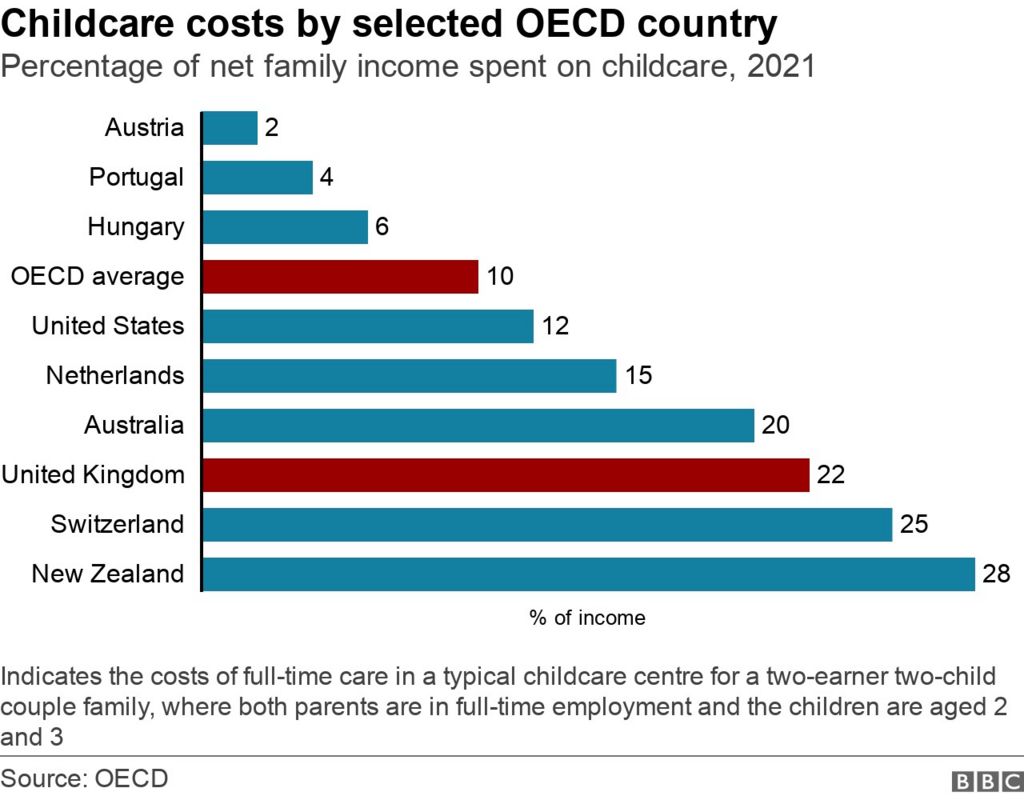
Working parents in England can start applying for 15 hours of funded childcare for their two-year-old from 2 January.
The plans, first announced in the 2023 Spring Budget, are being introduced to help with the high costs of childcare.
From April, working parents of two-year-olds will get 15 hours per week during term time, with children from nine months included from September.
The expansion should have fully rolled out by September 2025.
Who is eligible for 30 hours of free childcare, and how does it work?
At the moment, working parents of three and four-year-olds in England are eligible for 30 hours of free childcare per week during term time.
It is available for households where the parent or parents earn at least £8,670 a year, but less than £100,000.
In the Spring Budget in March 2023, Chancellor Jeremy Hunt said this scheme would be extended to cover younger children, on a phased basis:
- April 2024: eligible two-year-olds will be entitled to 15 hours of childcare per week during term time
- September 2024: eligible children from nine months will get 15 hours of childcare per week during term time
- September 2025: eligible pre-school children between nine months and school age will get 30 hours of childcare per week during term time
Applications for the first phase have opened, but parents are advised to register between mid-January and the end of February.
- Extra free childcare helps higher earners – report
- Free childcare plan: ‘Why do we have to wait?’
Who is eligible for 15 hours of free childcare for two-year-olds?
Some two-year-olds in England are already eligible for 15 hours per week of government-funded childcare during term time under certain circumstances, for example if the family receives universal credit.
All three and four-year-olds are entitled to 15 hours of childcare which can be used in private nurseries, state-run pre-schools or childminders.
The hours are available from the start of the term after the child reaches the relevant age.

Not all private nurseries offer these hours, and some charge parents extra money on top, to cover additional items such as nappies or snacks.
Will there be enough childcare places?
BBC analysis estimates that demand for childcare places is likely to have risen by about 15% by the time the expansion is in place. This is equivalent to more than 100,000 additional children requiring full-time care.
Childcare places in England fell by 1% in 2023, mainly because of childminders leaving the sector, but the government says the population of pre-school children is also decreasing.
The government is offering a £600 incentive for people to become childminders (or £1,200 via an agency) and is planning a recruitment campaign in January.
From April, it is also increasing the amount it pays providers to deliver childcare to an average of £11.22 per hour for under-twos, £8.28 for two-year-olds, and £5.88 for three and four-year-olds.
Local authorities distribute the funding to nurseries and childminders so the exact amount they get depends on where they are based.
But even the increased amount paid by government will not always cover the full cost.
An Education Select Committee report in July 2023 concluded that underfunding had left the sector “straining to provide” enough places.
The plans to expand funded childcare could allow 60,000 more parents of young children to enter the workforce, according to the government’s independent forecaster, the Office for Budget Responsibility (OBR).
But Paul Johnson, from the Institute for Fiscal Studies (IFS) think tank, predicted that plans would only help “a few tens of thousands” of parents return to work.
What other financial childcare help is available?
Under the tax-free childcare scheme, the government pays £2 for every £8 families contribute, up to a maximum of £2,000 per child per year (£4,000 for disabled children).
The money can be used for approved childcare including childminders, nurseries, nannies, and after-school clubs. It can be used as well as free childcare hours if parents qualify for both.
Families claiming universal credit (UC) who aren’t using the tax-free childcare scheme can get up to 85% of their childcare costs back.
UC recipients can claim £951 each month for childcare for one child, and £1,630 for two or more.
Parents moving into paid work or increasing their working hours receive the support upfront, instead of having to reclaim it, as was previously the case.
Parents under 20 in England, who are at school or sixth form college, can also receive weekly payments under the Care to Learn scheme, worth £180 per child per week outside London, or £195 inside the capital.
- Why more parents face losing child benefit
Are 15 and 30 free hours childcare available across the UK?
At the moment all three and four-year-olds are entitled to some free childcare throughout the UK.
Different schemes operate in Scotland, Wales and Northern Ireland, but wherever you live, care must be delivered by officially-registered providers.
- Scotland: Humza Yousaf announces plan to improve childcare
- What help is there with childcare costs in Wales?
- Northern Ireland: Pre-school education plans ‘do not go far enough’
How expensive is childcare across the UK and how does it compare to other countries?
The average cost of full-time nursery (50 hours a week) for a child under two in Britain is nearly £15,000 a year, according to the charity Coram. Equivalent care from a childminder is nearly £13,000.
The UK is the third most expensive country for childcare among members of the Organisation for Economic Co-operation and Development (OECD), behind Switzerland and New Zealand.
The OECD figures are based on a family with two children aged two and three who attend nursery for at least 40 hours a week, and take into account available state support.

How do childcare costs affect women?
Data from the Office for National Statistics (ONS) says about 1.3 million women don’t work due to caring responsibilities.
They are part of a wider group called the “economically inactive”, who are neither employed nor actively seeking work.
The Women’s Budget Group network says 1.7m women in England would do more paid work if they had better childcare.



